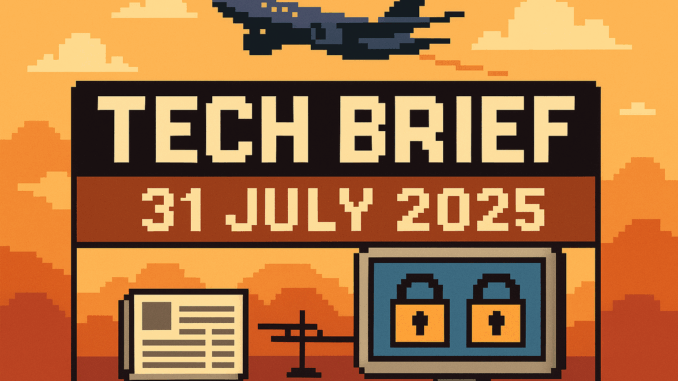
Picture this: you are juggling your phone at the airport, trying to check your flight status, when a sudden outage leaves you and hundreds of others grounded. At the same time, your inbox pings with yet another age check request. Welcome to Tech Brief 31 July 2025, where digital hurdles and unexpected tech victories are just part of the daily routine. Missed yesterday’s Tech Brief? Catch up here before diving in.
UK Online Safety Act Triggers 5 Million Extra Age Checks Daily, VPN Use Surges
UK internet users are now facing five million extra age checks every single day due to the Online Safety Act’s new rules for adult sites. The result is VPN downloads soaring as people look for ways around the restrictions. For anyone who remembers the thrill and frustration of early web filters, today’s VPN surge is a familiar dance. Privacy advocates warn that mandatory checks could increase surveillance and risk to personal data, while VPN providers are having their busiest week in years. Let’s not forget the engineers who built the first VPNs, often working in obscurity to keep our data safe. The ongoing push and pull between digital safety and privacy has always been about more than technology. How will these new identity checks shape the way we trust our digital world tomorrow?
UK Flights Disrupted as Air Traffic Control Outage Hits NATS Facility
Hundreds of flights across the UK were brought to a halt after a technical outage at the National Air Traffic Services (NATS) Swanwick centre. Airports scrambled, travellers were left stranded, and backup systems failed to prevent widespread disruption. We all know the feeling: one technical hiccup, and suddenly your plans are up in the air, quite literally. Since the introduction of computerised control in aviation, reliability has improved, but one flaw can still bring everything to a stop. The unsung teams at NATS who keep our skies moving deserve a nod, even when things go awry. This latest incident has already prompted renewed calls for robust backup protocols and real-time monitoring, echoing lessons learned during the Millennium Bug preparations. Will the next upgrade finally make our skies as reliable as our expectations?
Shot Scope Raises £6.6M to Expand Golf Tech Platform
Shot Scope, based in Edinburgh, has secured £6.6 million in debt funding to grow its golf analytics platform globally. The company’s wearable trackers and real-time data tools aim to serve an estimated 60 million golf players worldwide. If only our golf swings improved as quickly as our gadgets. This investment is another win for Scotland’s “Silicon Glen,” a region with a quiet history of tech innovation. Over the decades, British computers like the BBC Micro have powered everything from sports simulations to modern AI-driven insights. Shot Scope plans to use the new funding to speed up product development and enter new markets. The move promises smarter, more connected experiences for golfers and more recognition for regional tech talent outside London. Who knows, maybe the next breakthrough in sports tech will come from a repair bench in Edinburgh.
AI-Driven Security Lowers Breach Costs for UK Organisations
Despite the steady drumbeat of cyber threat headlines, UK organisations are seeing breach costs decline thanks to the rise of AI-enabled security tools. According to a new IBM study, companies using artificial intelligence for threat detection and response reported faster recovery times and less financial damage. This marks a shift from the early days of antivirus software and manual firewall tweaks, when security meant constant vigilance and crossed fingers. Today, machine learning helps spot patterns and stop attacks before they do real harm. Even smaller firms now benefit from advanced defences without massive IT budgets. The teams building these AI tools are the unsung heroes, quietly redefining digital safety for everyone. How will today’s AI tools shape the way we trust our digital world tomorrow?
From the Wayback Machine
On This Day: 1971 – Apollo 15’s Moon Buggy Debuts
Fifty-four years ago, Apollo 15 astronaut David Scott took the Lunar Roving Vehicle (LRV) for its first spin on the Moon. The LRV’s debut was the lunar equivalent of swapping your bicycle for a Land Rover. Suddenly, the Moon became open road. Built by Boeing and GM Delco, this folding, battery-powered marvel let astronauts travel further and collect more samples than ever before. Its four independent electric motors and mesh wheels were engineered for the harsh lunar surface, while the lightweight aluminium frame withstood extreme temperatures. With electric mobility introduced in space, engineers set the stage for decades of robotic and crewed exploration. The LRV’s legacy lives on in Mars rovers and modern electric vehicles, proving that cross-disciplinary engineering can change what’s possible, even 384,000 kilometres from Brighton.
What This Means
Tech Brief 31 July 2025 shows how digital regulation, infrastructure resilience and innovation keep shaping our lives. Let’s stay alert to new laws, smarter security and the engineering breakthroughs that keep our world connected. Every upgrade or outage is a reminder that technology is always about people first.
Stay curious, keep it retro, and let’s make every tech decision with a nod to the past and an eye on what’s next.
Missed yesterday’s Tech Brief? Catch up here.

Leave a Reply